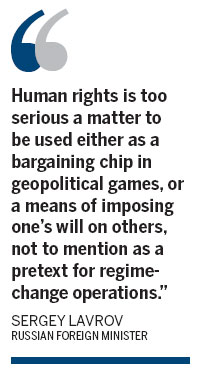Kiev accuses the Kremlin of invasion, asks it to withdraw soldiers in Crimea
Russian Foreign Minister Sergey Lavrov justified on Monday the use of Russian troops in Ukraine's Crimea region as a necessary protection for his country's citizens living there.
The use of Russian troops is necessary "until the normalization of the political situation" in Ukraine, Lavrov said at an opening of a month long session of the UN Human Rights Council in Geneva.
"This is a question of defending our citizens and compatriots, ensuring human rights, especially the right to life," Lavrov said.
Ukraine has accused Russia of a military invasion and has called on the Kremlin to withdraw its troops. Lavrov dismissed the criticism, and said that "new provocations are being committed, including against the Russian Black Sea fleet", which is based in Ukraine's Crimea, a strategic peninsula now effectively under Russian control.
"Those who are trying to interpret the situation as a sort of aggression and threatening sanctions and boycotts, these are the same partners of ours who have consistently encouraged their political forces in the ultimatum to refuse dialogue and ultimately have polarized Ukrainian society," Lavrov said. "We call upon them to show a responsibility and to set aside geopolitical calculations and put the interests of the Ukrainian people above all.

"Human rights is too serious a matter to be used either as a bargaining chip in geopolitical games, or a means of imposing one's will on others, not to mention as a pretext for regime-change operations," Lavrov told the council.
"As experience shows, military interventions on the pretext of civilian protection produce the opposite effect, compounding the sufferings of innocent civilians and depriving them of a fundamental human right, the right to life," he said.
UN Secretary-General Ban Ki-moon said he would emphasize to Lavrov ways of de-escalating the crisis and may seek creation of a "contact group" led by Swiss President Didier Burkhalter in his role as chairman of the Organization for Security and Cooperation in Europe.
"Both sides should engage in a dialogue," Ban told reporters.
European Union foreign ministers will push on Monday for high-level mediation to resolve the crisis over Crimea, while threatening the possibility of sanctions if Russia does not back down.
Ministers will try to strike a balance between pressure on Moscow and finding a way to calm the situation.
Germany, France and Britain, the EU's most-powerful nations, are all advocating mediation to resolve the crisis, possibly via the OSCE, while not ruling out economic measures if Moscow does not cooperate.
"Crisis diplomacy is not a weakness but it will be more important than ever to not fall into the abyss of military escalation," German Foreign Minister Frank-Walter Steinmeier told reporters as he arrived for the talks in Brussels.
The situation in Crimea has created the greatest confrontation between Russia and the West since the collapse of the Soviet Union in 1991, an event Putin has described as the worst geopolitical catastrophe of the 20th century.
French Foreign Minister Laurent Fabius took a similar line, saying France would be pushing on two fronts. "There's the condemnation of Russian intervention, and then there's the need for mediation, for dialogue," he said.
A draft of the statement EU ministers will make uses the phrase "strong condemnation" and calls on Russia to immediately withdraw its troops to base. Language on "targeted measures" against Russia remains in brackets, meaning it has not yet been agreed by all member states.
AP-Reuters
|
A pro-Russian activist waves the Russian state and Russian navy flags outside an entrance to the General Staff Headquarters of the Ukrainian navy in Sevastopol, Ukraine, on Monday. Andrew Lubimov / Associated Press |